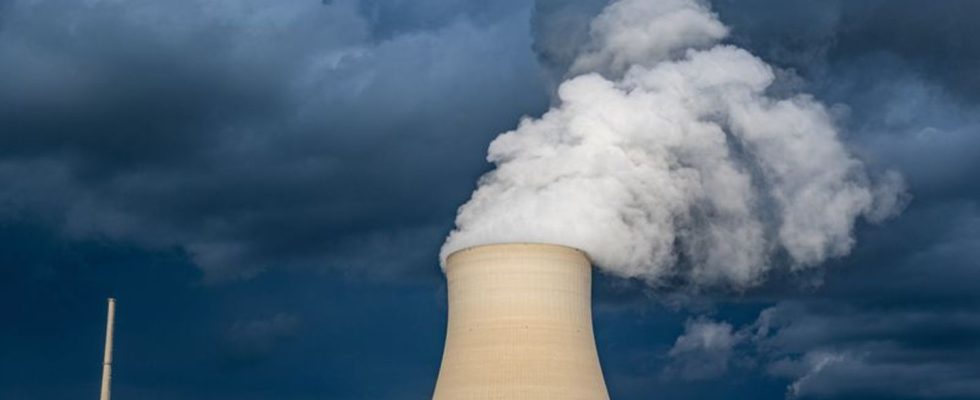energy transition
Wrestling until the last minute: FDP wants nuclear power reserve
Steam rises from the cooling tower of the Isar 2 nuclear power plant in Essenbach, Bavaria. photo
© Armin Weigel/dpa
On Saturday the use of nuclear energy in Germany should be over. That’s been clear for a long time. Nonetheless, it was debated until the last day.
A few days before the shutdown of the last German nuclear power plants, displeasure with the long-decided measure does not stop. Criticism continues to come from business, but also from the FDP. The Liberals at least want to keep the three nuclear power plants in reserve and not immediately dismantle them. The TÜV Association also does not consider the end to be necessary. Ex-Environment Minister Jürgen Trittin from the Greens, who helped negotiate the first phase-out of nuclear power, defended the final end of nuclear power in Germany.
On Saturday, the three remaining nuclear power plants in Germany – Isar 2 in Bavaria, Emsland in Lower Saxony and Neckarwestheim 2 in Baden-Württemberg – are to go off the grid for good. This was actually supposed to happen at the end of last year. However, because of the Russian war of aggression against Ukraine and the resulting energy crisis, the traffic light coalition decided last year to let the reactors continue to run over the winter.
Fukushima brought about a rethink
Now, on April 15, after around 60 years, the use of nuclear energy in Germany is supposed to end. In 2002, the red-green government decided to end nuclear power production after a “standard period” of 32 years per power plant. New buildings were no longer allowed. Eight years later, the CDU/CSU/FDP coalition extended the terms again. But after the Fukushima nuclear disaster in 2011, Chancellor Angela Merkel (CDU) pushed through the final exit.
Nuclear power has no future, ex-Environment Minister Trittin told the Tagesspiegel. Nuclear power is already four to five times as expensive as electricity from solar and wind power plants. Not even five percent of the world’s energy is produced by nuclear power. “Nuclear power is a niche technology,” said the environment minister from 1998 to 2005.
FDP Vice Wolfgang Kubicki, on the other hand, sharply criticized the nuclear phase-out. “The shutdown of the world’s most modern and safest nuclear power plants in Germany is a dramatic mistake that will have painful economic and ecological consequences for us,” Kubicki warned in the newspapers of the Funke media group.
Protection or “complete nonsense”?
The FDP is now advertising that it should at least keep the three nuclear power plants in reserve and not start dismantling them immediately. “You can turn it on again if a difficult situation arises,” said parliamentary group leader Christian Dürr in the ARD “Tagesthemen” about this option. “That’s complete nonsense,” Trittin commented on the idea. The legal situation would not allow this, he said.
Like other business associations, small and medium-sized businesses are also struggling with the end of nuclear power and fear negative consequences for companies. “To date, nuclear power has been relatively cheap and, in particular, the most secure supply,” said Markus Jerger, board member of the BVMW association of medium-sized companies, to the Funke newspapers. Germany currently has the highest energy prices in the world. “And some industries are on their knees as a result. Some of our members have already ruined electricity prices,” Jerger complained. He warned to “keep an eye on security of supply and, above all, affordability of electricity”.
Concern about industrial jobs
The President of the Economic Council of the CDU, Astrid Hamker, described the shutdown of the nuclear power plant as a “great danger for Germany as a business location”. The shutdown increases electricity prices for companies, Hamker told the editorial network Germany (RND). The federal government is thus promoting “the further migration of know-how and the loss of secure industrial jobs”.
From the point of view of the managing director of the TÜV association, Joachim Bühler, the three nuclear power plants could have “continued to run safely until the end of the decade”. “The systems are in very good condition,” Bühler stated in the “Bild” newspaper. They were put into operation in 1988 and 1989 and designed for a service life of at least 40 years. “From a safety point of view, the three nuclear power plants could continue to be operated for a number of years with regular maintenance and the appropriate safety checks,” said Bühler.

